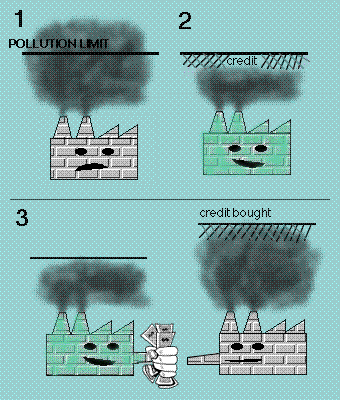|
|
| Back to Main Menu.. |
| Tradeable Pollution Rights | |
|
In situations where the environment cannot be privately owned, access rights or user rights can be owned. David James, previously Commissioner of the Resource Assessment Commission, says: When factories, for example, dump organic waste into streams they cause damage if their rights to use the assimilative capacity of the resource are uncontrolled. The destruction of open-sea fisheries through unrestricted harvesting, the pollution of beaches resulting from sewage discharges, and land degradation resulting from overgrazing and overcropping of marginal lands, are all examples of poorly defined or allocated user rights. (1991, p.8) Emissions trading is an alternative to pollution charges which allows firms to trade the right to emit specific pollutants. The only country where it is widely applied is in the USA, where it is used for air pollution. In that case, it aims to achieve economic efficiency rather than environmental effectiveness. That is, it aims to achieve a given level of standards at less cost to industry, and to enable continued economic growth despite restrictions on increases in air pollution. Tradeable pollution rights emerged in the USA when it was felt that economic growth would be constrained by air quality laws enacted as part of the Clean Air Act. Under these laws, maximum allowable concentrations for specific air pollutants were set for each region. The problem for regions which were already over the maximum allowable concentrations (non-attainment areas) was how to achieve economic growth when industrial growth was likely to add to the pollution load and therefore would be illegal.
|
© 2001 Sharon Beder

